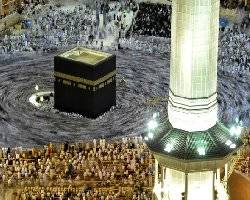Making the Most of Ramadan - I
12/07/2011| IslamWeb
The days of Ramadan pass by very quickly, as if they were fleeting moments. We welcomed Ramadan last year and bade it farewell and we are welcoming Ramadan again after a short while, so we should hasten to do good deeds in this month and strive to fill it with all the deeds which Allah The Almighty is pleased with and with that the actions which will help us on the Day when we meet Him.
How can we prepare for Ramadan?
We can prepare for Ramadan by taking ourselves to account and recognizing our shortcomings in living up to the testimony that none has the right to be worshipped but Allah The Almighty and that Muhammad is His Messenger.
We should set ourselves straight so that in Ramadan we will have a higher degree of faith, as faith increases and decreases. It increases through obedience to Allah The Almighty and decreases through disobedience and sin. The first act of obedience that a person should achieve is that of being a true slave of Allah The Almighty and believing that there is none that is rightfully worshipped except Allah The Almighty. Thus, a person should direct all acts of worship to Allah The Almighty and not associate anyone else in worship with Him. Each of us should realize that he could not have escaped whatever has befallen him, and whatever has missed him could not have befallen him, and that everything happens by the will and decree of Allah The Almighty.
We should avoid everything that could undermine our commitment to the two testimonies of faith. This means keeping away from innovations and things that have been introduced into the religion. We should also follow the principle of observing loyalty and disassociation by taking the believers as our allies, as well as regarding the disbelievers and hypocrites as our enemies, so we should rejoice when the Muslims gain a victory over their enemies. We must follow the example of the Prophet,  , and his Companions and adhere to the Sunnah (tradition) of the Prophet,
, and his Companions and adhere to the Sunnah (tradition) of the Prophet,  , and the way of the rightly-guided successors who came after him. We must love the Sunnah and love those who adhere to it and defend it, in whatever country they are, and of whatever color or nationality they are.
, and the way of the rightly-guided successors who came after him. We must love the Sunnah and love those who adhere to it and defend it, in whatever country they are, and of whatever color or nationality they are.
We should bring ourselves to account and recognize our shortcomings in performing acts of worship such as praying in congregation, remembering Allah The Almighty, paying attention to the rights of neighbors, relatives and the Muslims in general, spreading the greeting of Salaam, enjoining what is good and forbidding what is evil, urging one another to follow the truth, to be patient, to be steadfast in doing so, to persist in avoiding evil actions and in doing good deeds, and accepting the decree of Allah The Almighty with patience.
Then we should bring ourselves to account for committing sins and following desires. We should stop ourselves from persisting in that state, whether the sin is great or small, whether it is a sin of the eye, by looking at that which Allah The Almighty has forbidden, or by listening to music, or by walking to things which Allah The Almighty does not like, or by using one's hands to strike in a manner with which Allah The Almighty is not pleased, or by consuming things that Allah The Almighty has forbidden such as usury and bribes, or any other means of consuming people’s wealth unlawfully.
We should never forget that Allah The Almighty stretches forth His hand during the day to accept the repentance of those who sinned at night, and He stretches forth His hand at night to accept the repentance of those who sinned during the day.
Allah The Almighty Says (what means):
· {And hasten to forgiveness from your Lord and a garden as wide as the heavens and earth, prepared for the righteous who spend [in the cause of Allah] during ease and hardship and who restrain anger and who pardon the people - and Allah loves the doers of good; And those who, when they commit an immorality or wrong themselves [by transgression], remember Allah and seek forgiveness for their sins - and who can forgive sins except Allah ? - and [who] do not persist in what they have done while they know. Those - their reward is forgiveness from their Lord and gardens beneath which rivers flow [in Paradise], wherein they will abide eternally; and excellent is the reward of the [righteous] workers.} [Quran3: 133-136],
· { Say, "O My servants who have transgressed against themselves [by sinning], do not despair of the mercy of Allah. Indeed, Allah forgives all sins. Indeed, it is He who is the forgiving, the merciful.}[Quran 39:53]
· {And whoever does a wrong or wrongs himself but then seeks forgiveness of Allah will find Allah forgiving and merciful} [Quran 4:110]
This is the proper way to welcome Ramadan: by taking ourselves to account, repenting and seeking forgiveness. As the saying goes, “The wise man is the one who takes stock of himself and strives to do that which will benefit him after death, and the helpless one is that who follows his own desires and engages in wishful thinking, (assuming that Allah will forgive him regardless of what he does and that he does not need to strive to do good deeds).” [Narrated by Shaddaad ibn Aws] [Al-Albaani: Dha‘eef]
Making the Most of Ramadan - II
www.islamweb.net

